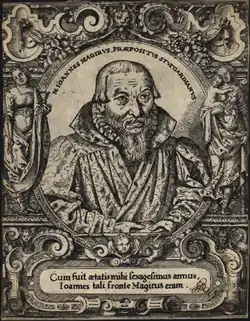
Johannes Magirus (c. 1590)
Johannes Magirus (c. 1560 – 1596) was a German physician and natural philosopher. He was born at Fritzlar about 1560; his background was Lutheran.[1] He studied at the University of Padua, and took a medical degree at the University of Marburg in 1585.[2]
Works
- Physiologiae Peripateticae libri sex (1597). This was a textbook treatment of Aristotelian philosophy, and was still in use 50 years later.[3] It was employed to teach physics in the early years of Harvard College.[4] Isaac Newton was introduced to natural philosophy by this work of Magirus and one of Daniel Stahl.[5] It used the works of: Hermolao Barbaro, Gasparo Contarini, Thomas Erastus, Philipp Melanchthon, Arcangelus Mercenarius, Francesco Patrizzi, Julius Caesar Scaliger, Jakob Schegk, Johannes Velcurio, Francesco Vimercato, and Jacopo Zabarella.[6]
Notes
- ↑ Charles B. Schmitt, Quentin Skinner, Eckhard Kessler (editors), The Cambridge History of Renaissance Philosophy (1991), p. 825;Google Books.
- ↑ Lorraine Daston, Michael Stolleis, Natural Law and Laws of Nature in Early Modern Europe: jurisprudence, theology, moral and natural philosophy (2008), p. 117; Google Books.
- ↑ Schmitt et al. p. 801; Google Books.
- ↑ Cotton Mather, Winton U. Solberg, The Christian Philosopher (2000), p. 25; Google Books.
- ↑ S. Ducheyne, Newton's Training in the Aristotelian Textbook Tradition: From Effects to Causes and Back, History of Science, vol. 43, p.217-237; Online.
- ↑ Lorraine Daston, Michael Stolleis, Natural Law and Laws of Nature in Early Modern Europe: jurisprudence, theology, moral and natural philosophy (2008), p. 118; Google Books.
This article is issued from Wikipedia. The text is licensed under Creative Commons - Attribution - Sharealike. Additional terms may apply for the media files.